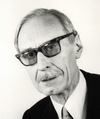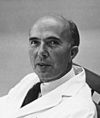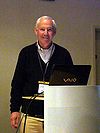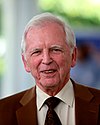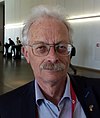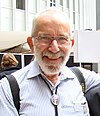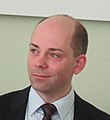Paul Ehrlich and Ludwig Darmstaedter Prize

(from left): Anthony Cerami , David Wallach and Tim J. Schulz during the press conference in Frankfurt am Main
The Paul Ehrlich and Ludwig Darmstaedter Prize has been awarded every year for pioneering research in medical science since 1952 - after the merger of two previously separate prizes. The award is endowed with 120,000 euros. It is traditionally awarded in the Paulskirche in Frankfurt on March 14th, the birthday of Paul Ehrlich . The prize is also named after the chemist and science historian Ludwig Darmstaedter .
The award is given to scientists with outstanding achievements from home and abroad in the medical fields worked on by Paul Ehrlich. In particular, these are immunology , cancer research , hematology , microbiology and experimental and clinical chemotherapy .
The prize awarded by the Paul Ehrlich Foundation is one of the most highly endowed and internationally renowned prizes awarded in the field of medicine in Germany. Numerous later Nobel Prize winners were among the prize winners . Half of the prize is financed by the German Federal Ministry of Health , the second half is financed from corporate donations.
Since 2006, the Paul Ehrlich and Ludwig Darmstaedter Young Talent Prize has also been awarded to people aged 40 or under for outstanding achievements in the field of biomedical research in Germany. This prize is endowed with up to 60,000 euros; the prize money must be used entirely for research purposes.
Foundation, endowment
Hedwig Ehrlich, Paul Ehrlich's widow, donated 90,000 marks to the Association of Friends and Supporters of Frankfurt University in the 1920s for a Paul Ehrlich fund, which was established on July 13, 1929, 14 years after Paul Ehrlich's death, in the Paul Ehrlich Foundation was transferred. Since then, the foundation's assets have been held in trust by the Association of Friends and Supporters. A Paul Ehrlich Prize was then awarded from 1930 to 1934, but it was initially discontinued as a result of National Socialism ; the foundation also had to cease its activities. When the Paul Ehrlich Foundation resumed its activities in 1952, the Board of Trustees and the Board of Directors of the Chemotherapeutic Research Institute Georg-Speyer-Haus Foundation decided to combine the Paul Ehrlich Prize and the Ludwig Darmstaedter Prize under the umbrella of the Paul Ehrlich Foundation.
Award winners
Prize winners 1952 to 1960
| year | Surname | Institution, place | image |
|---|---|---|---|
| 1952 | Gerhard Eissner | Federal Research Institute for Virus Diseases in Animals in Tübingen , Germany | |
| Wolf-Helmut Wagner | Nonnenhorn , Germany | ||
| 1953 | Adolf Butenandt | Max Planck Institute for Biochemistry in Munich , Germany | |
| 1954 | Ernst Boris Chain | Imperial College London in London , United Kingdom |

|
| 1956 | Gerhard Domagk | IG Farben in Elberfeld , Germany |

|
| 1958 | Richard Kuhn | Max Planck Institute for Medical Research in Heidelberg , Germany |
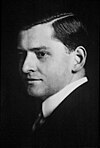
|
| 1960 | Felix Michael Haurowitz | Indiana University in Bloomington (Indiana) , Indiana |
Prize winners from 1961 to 1970
Award winners from 1971 to 1980
Prize winners 1981 to 1990
Prize winners 1991 to 2000
Prize winners 2001 to 2010
The award of the Paul Ehrlich and Ludwig Darmstaedter Prize 2005 to Ian Wilmut was not without controversy, especially since the federal government, which co-financed half of the prize, had spoken out in favor of a cloning ban in the UN General Assembly.
| year | Surname | institution | Reason for awarding the prize | image |
|---|---|---|---|---|
| 2001 | Stephen C. Harrison | Harvard University in Cambridge , Massachusetts | "... for her groundbreaking work on deciphering the three-dimensional structure of virus proteins ." |

|
| Michael Rossmann | Purdue University in West Lafayette , Indiana | |||
| 2002 | Craig Venter | J. Craig Venter Institute, Rockville , Maryland | "... for the discovery and establishment of the automated sequencing of cDNA libraries and for the sequencing of various organisms - from the smallest microbes to humans." |
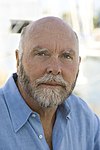
|
| 2003 | Richard A. Lerner | Scripps Research Institute in La Jolla , California | “... for the proof that the antibodies generated by the immune system can be adapted to any chemical functions as enzyme-like reaction mediators . A large number of enzyme-like reaction mechanisms could be elucidated in detail in this way. " | |
| Peter G. Schultz | ||||
| 2004 | Tak Wah Mak | University of Toronto in Toronto , Canada | “... for their discoveries on the specificity and function of the so-called T-cell receptor . " | |
| Mark Davis | Stanford University in Stanford , California |
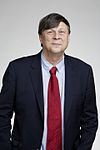
|
||
| 2005 | Ian Wilmut | University of Edinburgh in Edinburgh , Scotland | "... for his groundbreaking experiments that led to the cloning of a mammal." | |
| 2006 | Craig Mello | Howard Hughes Medical Institute and University of Massachusetts Medical School in Worcester , Massachusetts | "... for the discovery of so-called non-coding double-stranded siRNAs (small interfering ribonuclein acid), also known as mediators of RNA interference (RNAi)." |

|
| Andrew Z. Fire | School of Medicine at Stanford University in Stanford , California |

|
||
| 2007 | Ada Yonath | Weizmann Institute for Science in Rechovot , Israel | "... for their outstanding contributions to the elucidation of the three-dimensional structure of ribosomes - the complex cell organelles on which protein biosynthesis takes place." |

|
| Harry Noller | University of California, Santa Cruz in Santa Cruz , California | |||
| 2008 | Tim Mosmann | University of Rochester in Rochester , New York | “... for his outstanding contributions in the field of immunology. ... Tim Mosmann's research has led to the discovery of two subtypes of helper T-lymphocytes , Th1 and Th2 cells, and has enabled new insights into the disease mechanism of infectious diseases and allergies. " |

|
| 2009 | Elizabeth Blackburn | University of California, Berkeley in Berkeley , California | "... for their outstanding research achievements in the discovery of telomeres and telomerase and elucidation of their importance for cell division and cell aging." |

|
| Carol W. Greider | Johns Hopkins University in Baltimore , Maryland |

|
||
| 2010 | Charles Dinarello | University of Colorado School of Medicine in Denver , Colorado . | "... for his outstanding research achievements in the field of cytokines ." |
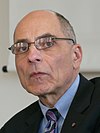
|
Award winner since 2011
| year | Surname | institution | Reason for awarding the prize | image |
|---|---|---|---|---|
| 2011 | Cesare Montecucco | University of Padua in Padua , Italy | "... for his outstanding research achievements in the field of pathogenic diseases such as tetanus ." |

|
| 2012 | Peter Walter | University of California, San Francisco in San Francisco , USA | "... for his outstanding research achievements in the field of cell biology ", especially for the discovery of the signal recognition particles . |

|
| 2013 | Mary-Claire King | University of Washington in Seattle , USA | "... for discovering that there is a genetic disposition for breast cancer." |

|
| 2014 | Michael Reth | Institute for Biology III at the Albert Ludwig University of Freiburg , Germany | “... for his outstanding research achievements in the field of antibody research. He showed how the B cells of the immune system are activated and made to produce antibodies. " |
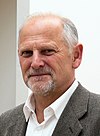
|
| 2015 | James P. Allison | MD Anderson Cancer Center, University of Texas , USA | "... for their pioneering work on immunotherapy against cancer . [...] James Allison is a pioneer of checkpoint inhibition for the treatment of advanced melanoma , Carl June developed the CART-19 therapy for leukemia . " |
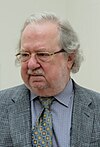
|
| Carl H. June | Pennsylvania Perelman School of Medicine, University of Pennsylvania , USA |

|
||
| 2016 | Emmanuelle Charpentier | Max Planck Institute for Infection Biology , Berlin , and Umeå University , Sweden | “... for their work that led to the development of the programmable gene scissors CRISPR-Cas9 . These gene scissors are part of the bacterial immune system. " |

|
| Jennifer Doudna | University of California , Berkeley , USA |

|
||
| 2017 | Yuan Chang | University of Pittsburgh , USA | "... for your work on tumor viruses ." |

|
| Patrick S. Moore | University of Pittsburgh, USA |

|
||
| 2018 | Anthony Cerami | Araim Pharmaceuticals, Tarrytown, New York State | “For their research on the messenger substance TNF and its effect on inflammation”. |
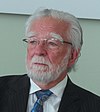
|
| David Wallach | The Weizmann Institute of Science in Rehovot |

|
||
| 2019 | Franz-Ulrich Hartl | Max Planck Institute for Biochemistry, Munich | "... for her fundamental work on protein folding ." | |
| Arthur Horwich | Yale University and Howard Hughes Medical Institute | |||
| 2020 | Shimon Sakaguchi | Osaka University, Japan | "... for the discovery of regulatory T cells." |

|
| 2021 | Michael R. Silverman | Agouron Institute | "... for discoveries about bacterial communication." | |
| Bonnie L. Bassler | Princeton University |

|
||
| 2022 | Katalin Karikó | University of Pennsylvania | "... Research and development of messenger RNA (mRNA) for preventive and therapeutic purposes." |

|
| Özlem Türeci | BioNTech |

|
||
| Ugur Sahin | BioNTech |

|
Young Prize Winner
The Paul Ehrlich and Ludwig Darmstaedter Young Talent Prize has been awarded since 2006. The recipients must not have reached the age of 40 and must have achieved excellent results in the field of biomedical research in Germany. The prize money is up to 60,000 euros and must be used for research purposes.
Award winner since 2006
- 2006: Ana Martin-Villalba , DKFZ Heidelberg, for her "fundamental and internationally acclaimed contributions to the role of the CD95 signal system for physiological and pathophysiological processes in the nervous system ".
- 2007: Michael Schindler , Ulm University , for his "internationally acclaimed work on the Nef protein and its importance for the development of AIDS ".
- 2008: Eckhard Lammert , research group leader at the Max Planck Institute for Molecular Cell Biology and Genetics in Dresden , for his "outstanding biochemical work in the field of diabetes research".
- 2009: Falk Nimmerjahn , Laboratory for Experimental Immunology and Immunotherapy at the University of Erlangen-Nuremberg , for his "outstanding work in the field of immunology ".
- 2010: Amparo Acker-Palmer , professor at the Johann Wolfgang Goethe University in Frankfurt am Main , for her work on “Parallels in the network formation of nerve cells and blood vessels ”.
- 2011: Stephan Grill , research group leader at the Max Planck Institute for Molecular Cell Biology and Genetics and at the Max Planck Institute for the Physics of Complex Systems in Dresden, for his "contributions in the field of cell biology ".
- 2012: Kathrin Mädler , head of the Laboratory for Molecular Diabetology at the Center for Biomolecular Interactions at the University of Bremen , "for her innovative and new approaches to understanding apoptotic processes in the development of type 2 diabetes ."
- 2013: James Poulet , Max Delbrück Center for Molecular Medicine Berlin "for research into how the brain processes sensory perceptions that trigger behavior and lead to precise movements."
- 2014: Andrea Ablasser , University of Bonn , "for her research into how the immune system (the innate immune system ) recognizes viruses and bacteria."
- 2015: Raja Atreya , University of Erlangen-Nuremberg, "for a new type of diagnostic agent that can be used to predict whether patients with Crohn's disease will benefit from therapy with a TNF-α antagonist."
- 2016: Claus-Dieter Kuhn , University of Bayreuth , "for his work with ribonucleic acids, which are not translated into proteins, but take on other tasks in the control of cellular processes."
- 2017: Volker Busskamp , Center for Regenerative Therapies Dresden (CRTD), for his connection of "nerve cells to artificial circuits in the Petri dish" and his approaches to gene therapy for retinitis pigmentosa .
- 2018: Tim J. Schulz , German Institute for Nutritional Research , for his work on white and brown fat cells .
- 2019: Dorothee Dormann , Ludwig Maximilians University Munich , for her work on the causes of severe neurodegenerative diseases.
- 2020: Judith Reichmann , European Molecular Biology Laboratory (EMBL) in Heidelberg, for demonstrating why mouse embryos sometimes have the wrong number of chromosomes or have more than one nucleus per cell.
- 2021: Elvira Mass , University of Bonn , for work on the importance of specialized immune cells from the yolk sac that help the development of organs.
Stephan Grill , young talent of the year 2011
Andrea Ablasser , winner of the 2014 Young Talent Award
Raja Atreya , 2015 Young Talent Award Winner
Volker Busskamp , 2017 young talent award winner
Tim J. Schulz , 2018 Young Talent Award Winner
See also
Web links
Individual evidence
- ↑ The Paul Ehrlich and Ludwig Darmstaedter Prize. On: uni-frankfurt.de , accessed on March 16, 2018
- ↑ The Paul Ehrlich and Ludwig Darmstaedter Young Talent Award. On: uni-frankfurt.de , accessed on March 16, 2018
- ↑ Honestly, Paul. Entry in the Frankfurt dictionary of persons
- ↑ Brochure: The Paul Ehrlich Foundation.
- ↑ Paul Ehrlich and Ludwig Darmstaedter Prize Winners 1999: Robert Gallo at Informationsdienst Wissenschaft (idw-online.de); Retrieved April 5, 2011
- ↑ Paul-Ehrlich and Ludwig-Darmstaedter Prize is awarded to the discoverers of programmed cell death. (PDF, 186 kB) in Biospektrum (thelancet.de); Retrieved May 15, 2011
- ↑ Controversy over Paul Ehrlich Prize for clone sheep creator Wilmut Controversy over Paul Ehrlich Prize for clone sheep creator Wilmut , FAZ, March 13, 2005
- ^ Paul Ehrlich Prize: Controversy over award for clone researchers [1] , Spiegel, March 11, 2005
- ↑ Scientific lectures of Paul Ehrlich and Ludwig Darmstaedter Prize winner in the Paul Ehrlich Institute, March 15, 2001 in the press archives of the Paul Ehrlich Institute (pei.de); Retrieved April 4, 2011
- ↑ a b James P. Allison and Carl H. June receive the Paul Ehrlich and Ludwig Darmstaedter Prize 2015. Paul Ehrlich Foundation, January 29, 2015
- ↑ Emmanuelle Charpentier and Jennifer A. Doudna have radically simplified the editing and editing of the genome. On: uni-frankfurt.de from March 14, 2016
- ↑ a b Yuan Chang and Patrick Moore receive the Paul Ehrlich and Ludwig Darmstaedter Prize 2017. On: uni-frankfurt.de from January 23, 2017
- ↑ Press release of the Paul Ehrlich Foundation of January 23, 2017
- ↑ Franz-Ulrich Hartl and Arthur L. Horwich receive the Paul Ehrlich and Ludwig Darmstaedter Prize 2019. On: uni-frankfurt.de on January 16, 2019
- ↑ Laureates 2020
- ↑ Katalin Karikó, Özlem Türeci and Uğur Şahin receive the Paul Ehrlich and Ludwig Darmstaedter Prize. September 21, 2021, accessed September 21, 2021 .
- ↑ Claus-Dieter Kuhn receives award for insights into the tasks of ribonucleic acids, which are not overwritten in proteins. On: uni-frankfurt.de from March 14, 2016
